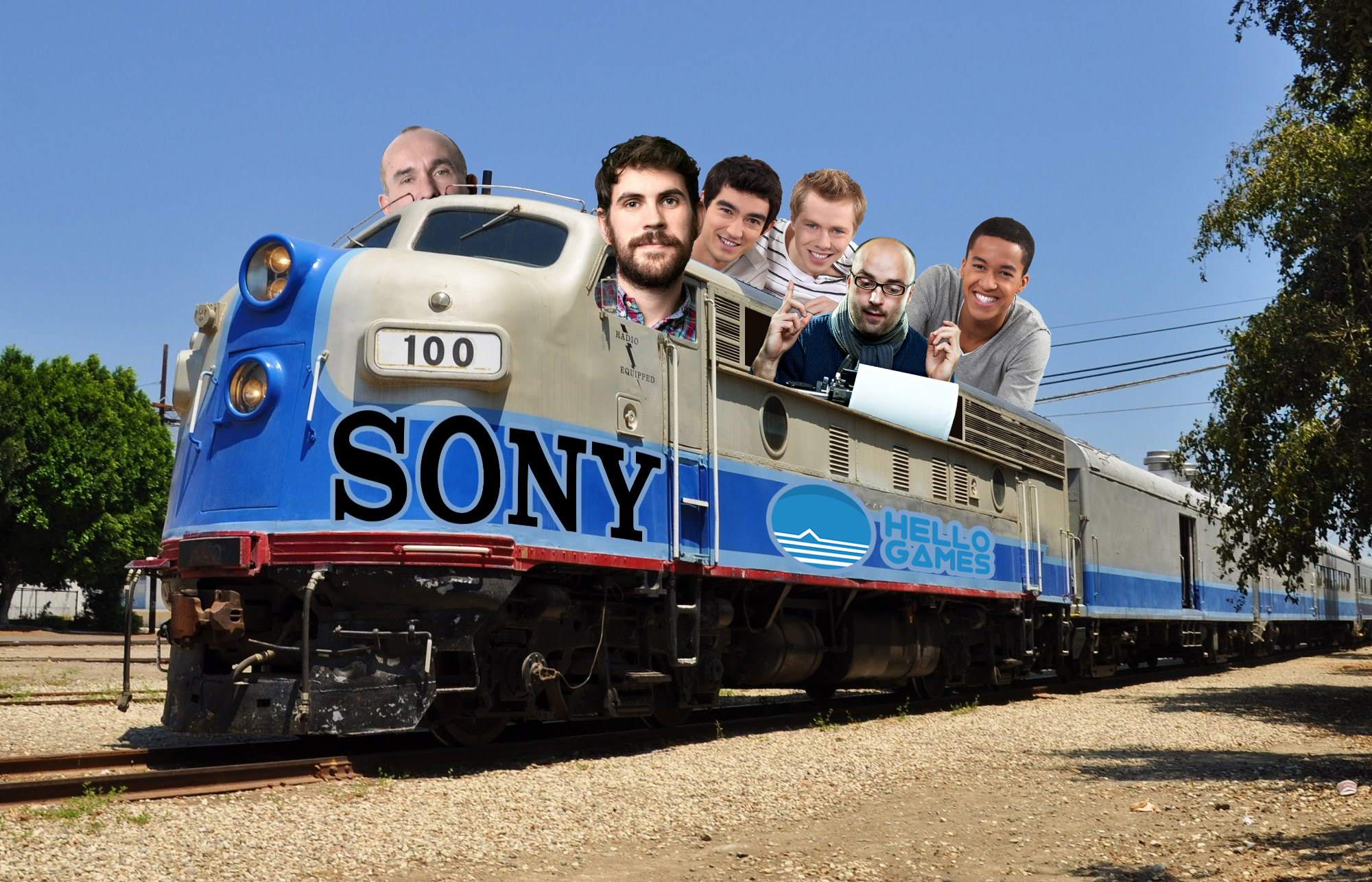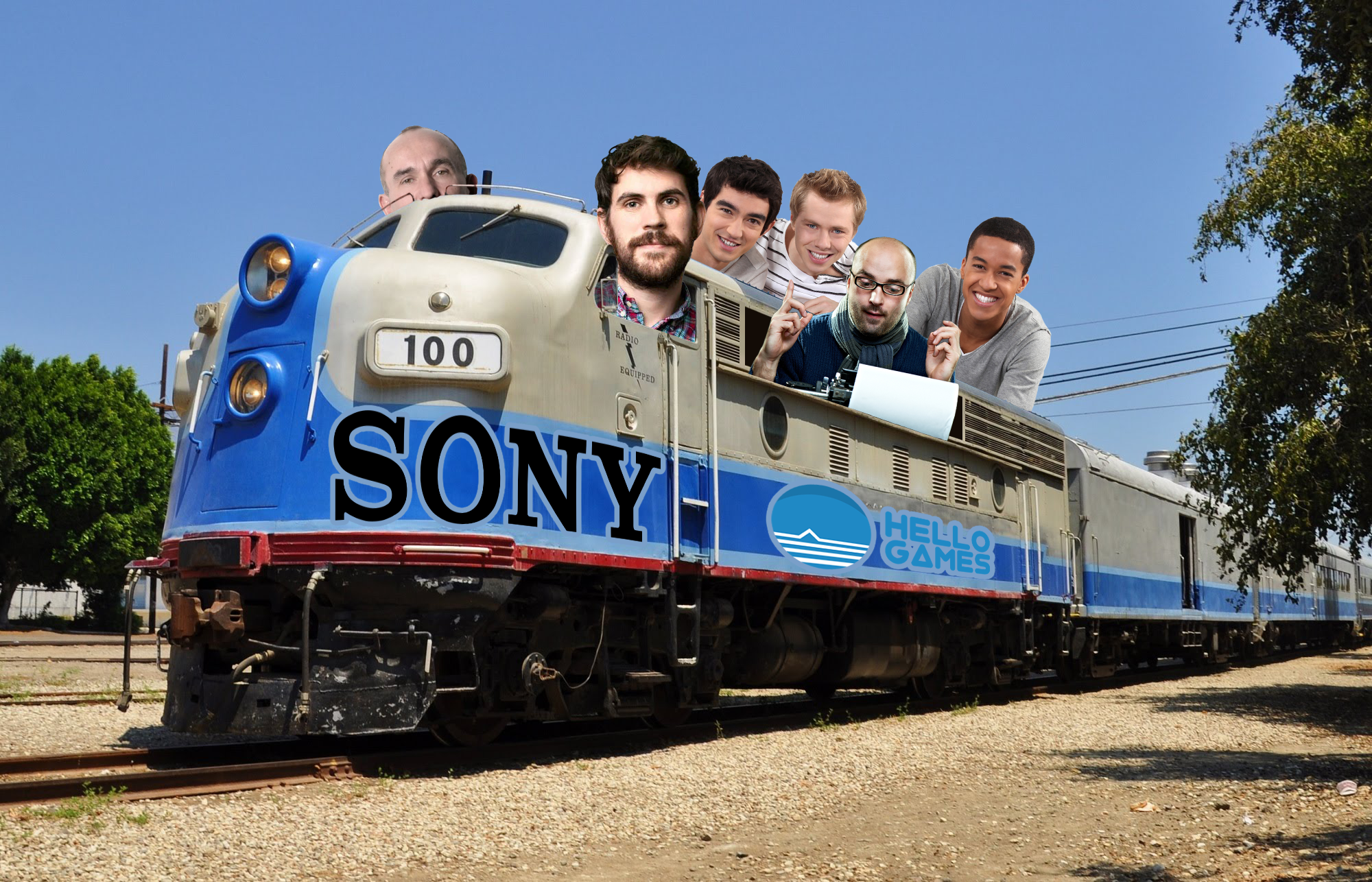Video game culture, and even nerd culture as a whole, seem to revolve around one thing: hype. People will get excited over the littlest things, and it’s unsurprising considering we scramble over the tiniest piece of content we can grab. Some gamers live from expansion to expansion, from sequel to sequel, and if you manage to get a good standalone game, there will be no doubt that somebody is going to want more. Problem is, how much more can be given and what can be promised?
If you’re unfamiliar with the recent debacle of No Man’s Sky, let me give you a quick rundown: the developers over at Hello Games showed an amazing trailer for No Man’s Sky back in 2014, which began a hype train of epic proportions. Gamers and game journalists alike built up the game like there was no tomorrow, all of which was spurred on by Hello Games’ lists of promises and Sony’s marketing — a long list of promises that, at best, you could say didn’t pan out the way they wanted, or at worst were completely fraudulent. You can word it however you wish. After reading through it several times, combing over every piece of information, reading forum posts, watching videos, going through the comments, and looking through Twitter there was a conclusion that I came to that was downright inescapable.
The hype train ruins games.
Now, for anyone who has played video games for any length of time this is more than likely obvious, but there is a part of that that people may not expect to hear.
See, gamers like to blame the developers, who then blame the gamers and then the journalist blames the developers and the gamers, then the gamers blame the developers and the journalists. If that sentence seems like a mess to you, that’s because it is, because people enjoy playing the blame game without noticing that we are all conductors on this hype train, whether we like to admit it or not.
Let me explain.
Developers
In recent years, game developers have a history of talking a big game and not necessarily delivering on it. As we all know, the trailer we were given for No Man’s Sky is a far cry from what was actually delivered. Here’s a humorous video that shows a little more of that:
Now that we’ve gotten a few chuckles out of our system, let’s get down to the nitty gritty of this. Trailers are used as a marketing tool to get people excited about the game. Hit games like Bioshock Infinite had a trailer that looked drastically different from the final product, but it was still received positively among critics and gamers alike. This begs the question: where did Hello Games go wrong in all of this?
Promises.
While the developers never exactly said the word “I promise that the game will be like this,” they did list off a variety of features that never made it to the game’s release. It’s a long list of unfulfilled hopes and dreams that made quite a few people upset, causing them to return copies of their games, and to even initiate a lawsuit against Hello Games. No Man’s Sky can be viewed as a cut and dry case of a bait and switch, with gamers being the victims of it. There was so much hype built up with game director Sean Murray’s interviews that it was insane.
In fact, it reminded me of a hype train that was built quite a long time ago, back in 2004, by a man named Peter Molyneux. A director of a game making big promises that his team may not have the money or technology to fulfill? Check. A director that’s become the face of the game, who then gets all the backlash? Check. The game is received lukewarmly by gamers, but warmly by the press? Check once again with a big star next to it.
History appears to be repeating itself, which makes one wonder if there was anything that could have been done to prevent this. The obvious answer would be: “well just don’t lie then,” but it does make one wonder if those supposed lies were intentional or not. Perhaps these features were meant to be included but they ran over budget? Or maybe they were included but were later removed because it didn’t work as well as they’d hoped? Or maybe Sony had something to do with cracking the whip to try to get it out faster? They did have quite a bit to do with the games hype, since they showed it off during their 2014 E3 presentation.
There is also the fact that marketing purposely uses deceptive language in order to get you invested in a product. Games being no exception to this. Words and language are a powerful thing. They can mean something different depending on how they’re used and marketing can use them to dig claws into you and never let you go.
No matter what the reason, gamers felt lied to and it’s a completely understandable feeling to have. There was no way the backlash could have been avoided either. Even if they had come clean about how all these features weren’t included, they still would have lost money due to cancelled pre-orders, and people probably still would have been upset. It was unavoidable, so they took the sleazier way out and built up the game enough so people would buy it without question. Morals didn’t apply, which is a shame, because this shows what happens when a more independent developer gets swallowed up by their own hubris and ego.
Speaking of which;
Game Journalists
After my last article about how Game Journalists helped the shutdown of Pokémon Uranium, I learned that my fellow journalists don’t always take too kindly to criticism. You could say that many of them were my most vitriolic commenters over on social media. This is of course the exact reason I’m doing this again, because I find that taking criticism is a lot easier when it comes from someone of your own profession.
This brings me to our role in hyping up No Man’s Sky. Now, for those of you who don’t know, it is our job as game journalists to report on the news, write up compelling editorials, write reviews, and other things like that. In the case of No Man’s Sky we did just that: we reported on everything that the developers said, and we continued the hype train like it was our job. It’s the phrase “don’t shoot the messenger” in journalistic form, because all we are doing is delivering the news.
The problem lies in when we only do PR for a game, rather than actually looking at things through a more journalistic lens. When we are given a game’s “press release,” we are expected to write what’s in the press release to help promote it and that’s it. The problem is that we don’t apply our critical eye to things that aren’t press releases, like Interviews, or even videos of the game play footage that was sent to us by fans. I’m not saying we need to criticize them like we would released finished game, but we still should explain what was there and what wasn’t.
An 18 minute demo from IGN showed them just marveling at No Man’s Sky’s beauty, but it should have had some form of critique as well, like asking where the missing features are. A demo is supposed to show what the full game can do. This was so close to releasethe demo should have been looked at as a preview of what was going to come out a month later. It’s not like an Early Access game or a Kickstarter demo where the game could still be in its earliest playable state; if the game is a month away from release, the public needs to know things that you noticed. It’s valuable for the developers too, because they’ll know what they can try to fix before release. It’s possible to enjoy a game while acknowledging its faults. Last time I checked that was our job.
What’s not our job is to defend a developer from the gaming public and that’s what I’ve been noticing quite a bit with the No Man’s Sky debacle. Articles that vilify gamers as an online hate mob are unnecessary, because there’s quite a difference between real criticism and stirring the masses into a frenzy. That’s not to say there aren’t some individuals out there who aren’t willing to do that, but for the most part, No Man’s Sky has received both constructive and non-constructive criticism from people. We can report about how a developer is getting threats, we can report on people’s reactions to the game, but what we shouldn’t do is constantly crucify those we write for. Criticism is fine, just don’t burn everyone at the stake in one fell swoop. This brings me to our last conductors in our Hype Train:
Gamers
There’s an old adage that I think applies to gamers in the case of No Man’s Sky: “Fool me once, shame on you, fool me twice, shame on me.” And as gamers, let’s face it, we’ve allowed ourselves to be fooled more than once. From Fable to Duke Nukem Forever, to Watch_Dogs we’ve seen this time after time, and yet we let ourselves just get sucked into it every time it happens.
We are so easily deceived by a good trailer and a demo at E3, with a million little promises. We hype up a game more than developers, publishers and journalists and we aren’t even getting asked or paid to do it. We are not only deceiving ourselves but we are deceiving each other into thinking that this next game will be the game to end all games! It’s easy to get excited about a game that looks good and seems like it plays well. There’s nothing better than to see a game that just checks all your boxes on what an amazing game could be and wanting it so badly to meet expectations. I’m going to tell you to do one thing though:
Stop it.
At this point, we have disappointed countless times. We need to use a critical eye on these things. As the consumers, we are the ones spending money here and we can’t just rely on news and interviews to give us all we need to know about the game. Demos can be made specifically for a showroom setting and not have any bearing on the final product — like what happened with Aliens: Colonial Marines. Because a game looks a certain way in Alpha and Beta doesn’t mean it will look that way once it’s complete.
Developers and publishers think their game is good because they were the ones that made it. Oftentimes creators don’t think a work is terrible while they are working on it, it’s only afterward that they’ll realize their mistake. That’s something you need to keep in mind. Don’t immediately buy into your friend’s “leaks” about a game, since they may not necessarily be true. We all knew that kid at school; the one who claimed that, no really, you can play as Sonic in Super Smash Bros. Melee. Only now that kid is 15 years older, and moved from the playground to the internet. I’m not saying you need to be a cynical person always questioning every single thing, I’m just saying to shop smart. Being skeptical is important Actually, it’s probably the most important thing as a consumer, because it’s your money and not everyone has the money to shell out for a 60 dollar game once a month.
However, if you find yourself disappointed again, which happens no matter how consumer savvy we may be, don’t take it out on other people. Make sure your criticism is constructive and not destructive because, believe it or not, people tend to not react too well to things like, “Your game sucks eggs”. It’s better to figure out what the problems were, including the marketing for it, and addressing those accordingly in a civil manner.
Just blathering on about it on social media doesn’t do anything. Yelling at Sean Murray, or at the journalists who reviewed it favorably won’t do anything. But forming constructive criticism may do something. There are countless videos out there where people have channeled their disappointment or anger to offer constructive criticism to No Man’s Sky. Not everyone may get refunds, but at the very least we are able to learn from our mistakes and try to buy smarter in the future to prevent this from happening again.
In Closing
No Man’s Sky isn’t a game that’s without hope that needed to be completely scrapped. It was just a game that had a lot of missed opportunities. It was a game that was overhyped and overblown by the people who claimed to love it, which has happened before and will no doubt happen again. Hopefully, No Man’s Sky will serve as a reminder for what happens when the hype train has no brakes.
What do you think about the No Man’s Sky Hype and the concept of a Hype Train? How do you think we can prevent ourselves from getting disappointed in the future? Leave a comment below.









Published: Oct 15, 2016 06:56 am